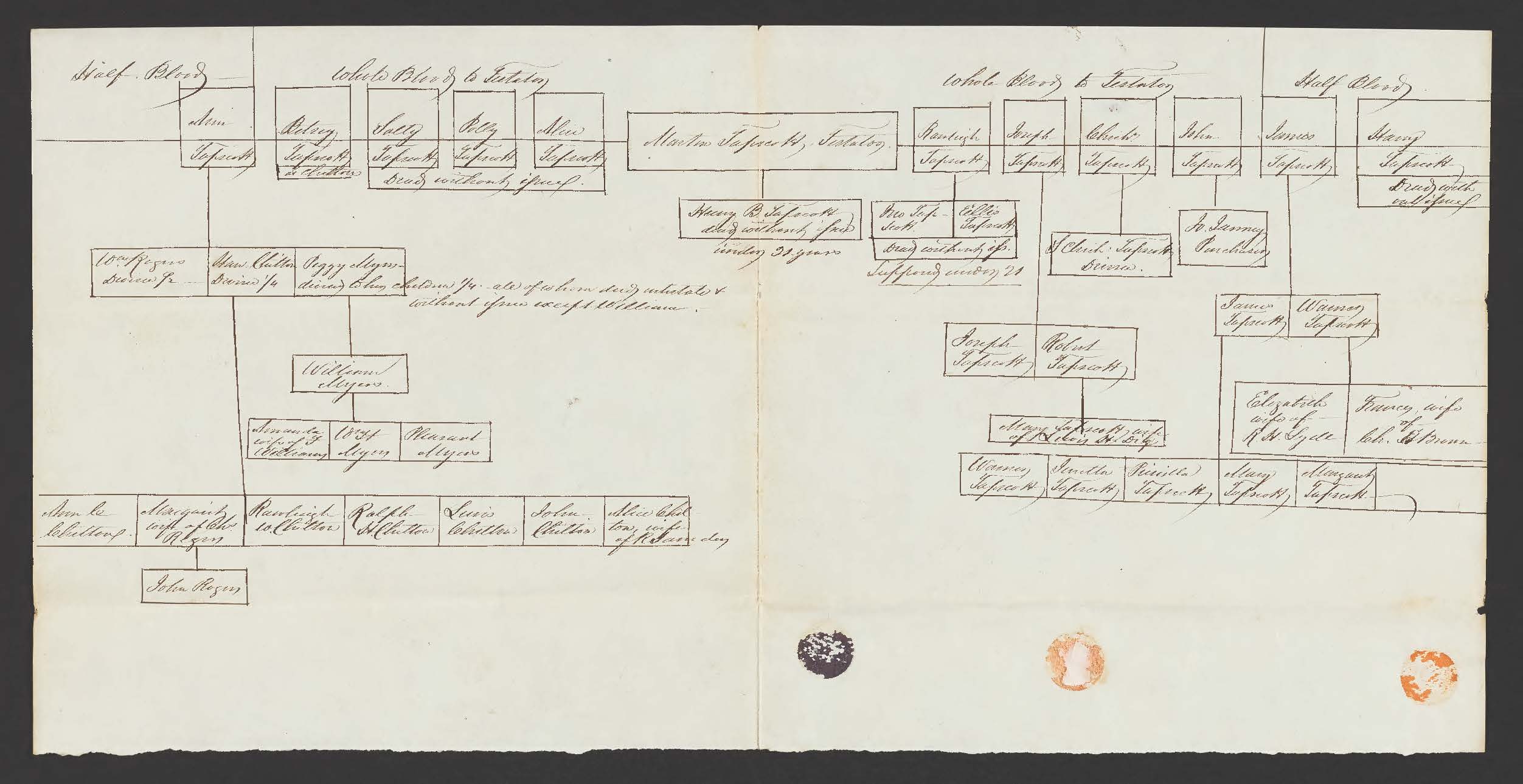The Library of Virginia is pleased to announce that digital images for the Westmoreland County (Va.) Chancery Causes, 1753-1901, are now available online through the Chancery Records Index on Virginia Memory. Chancery cases are useful when researching local history, genealogical information, and land or estate divisions. They are a valuable source of local, state, social, and legal history, and serve as a primary source for understanding a locality’s history.
193_1854_007_0026_gen chart
1854-007: Samuel C. Tapscott, etc. vs. Ann L. Tapscott, etc.
Genealogy chart
Following are a few suits of interest found in the Westmoreland County chancery collection. 1839-003: Dempsey Porter Gilbert vs. Admr. of William Porter, includes several depositions attacking the character of a Frenchman named Lewis Mazuro in an effort to undermine testimony he gave on behalf of the plaintiff. The deponents accused him of keeping a whiskey shop and a tipling house—and worse, drinking and gambling with large companies of enslaved people. 1854-007: Samuel C. Tapscott, etc. vs. Ann L. Tapscott, etc., concerns a dispute among numerous relatives of Martin Tapscott over how to divide his estate. The cause includes a genealogy chart listing names of family members who were related to Martin Tapscott by “whole blood” and “half-blood.”
1853-014: Rodham Douglass, etc. vs. Elizabeth Harrison, etc.
Deposition of Roxy Ball Harrison
Chancery cause 1866-003: William Fortune vs. Sally Fortune and 1867-005: James W. Bailey vs. Mary C. Mothershead is a divorce case that reveals the impact the Civil War had on marriages.
Chancery causes are also a rich resource for African American history and genealogy. 1852-004: Julia L. Bailey vs. John Critcher, Jr., details efforts by enslaved people to resist enslavement by constantly running away to nearby swamps. 1853-014: Rodham Douglass, etc. vs. Elizabeth Harrison, etc. contains numerous depositions about an enslaved woman, Ellen, who was frequently referred to as “deranged.” One deponent testified “she was deranged a woman as ever I saw in my life. We had to keep her everlastingly fastened to a large block.” Ellen’s enslaver sold her while she was fastened to the block.
1854-010: Petition of the Guardian of Mary F. Carter, etc., shows the reluctance of enslavers migrating West to bring their enslaved people with them because they ”might endeavor to make their escape to Illinois which is a free state and has the name of being connected with Canada by the underground railroad.”
1855-011: William G. Pierce vs. Admr. of Ransdell Pierce, etc. is a dispute related to the sale of enslaved people. Sydnor and Susan were not sold because they claimed to be emancipated and filed suit to prove their freedom. Their freedom suits can be found on Virginia Untold. 1868-011: Frederick Campbell, etc. vs. Charles Montague, etc., reveals how enslavement made it difficult for African Americans to prove family relationships after emancipation.
1854-010: Petition of the Guardian of Mary F. Carter, etc
Correspondence between Daniel T. Wright, guardian of the Carter children residing in Missouri, and George Lewis, trustee of the Carter family estate in Westmoreland County.
Additional causes of interest can be found in the finding aid for the Westmoreland County chancery causes. The processing and scanning of the Westmoreland County chancery causes were made possible through the innovative Circuit Court Records Preservation Program (CCRP), a cooperative program between the Library of Virginia and the Virginia Court Clerks Association (VCCA), which seeks to preserve the historic records found in Virginia’s circuit courts.
-Greg Crawford, Local Records Program Manager







Looking forward to spending more time in the Chancery Causes. Thank you LVA for your dedication in providing digitized records for those who cannot always come to Richmond. My first priority when deciding where to send my small donations are usually for libraries and preservation and digitized access of archived records. Virginia history & genealogy are of primary interest.